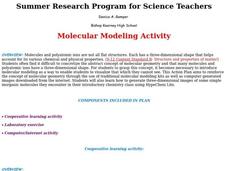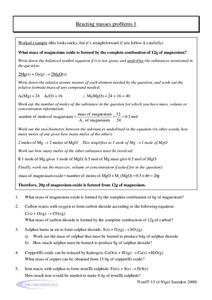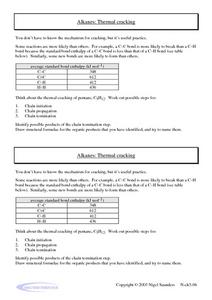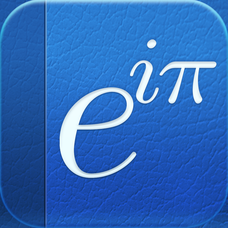Curated OER
Matter and Change
In this matter and change worksheet, students answer 24 questions on topics such as elements, compounds, mixtures and chemical reactions. Students answer questions about the properties of matter such as their physical state and shape. In...
Curated OER
Molecular Modeling Activity
Learners work together to explain the VSEPR theory and how it relates to molecules. They name electron pairs that can surround the central atom of an organism. They discuss the factors that determine the polarity of a molecule as well.
Curated OER
Reacting Masses Problems
In this chemical reactions worksheet, students follow steps to determine the mass of compounds formed by the combustion of an element. This worksheet has 5 problems to solve.
Curated OER
Follow Up Questions Lab 1-Chemical Reactions
In this chemical reactions worksheet, students answer follow up questions to a lab where they were observing chemical changes in reactions after mixing products such as hydrochloric acid and sodium bicarbonate. They answer six questions...
Curated OER
Pyrites
Students examine the mineral pyrite and discover the differences between it and gold. In this mineral lesson students identify minerals using their common properties.
Creative Chemistry
Alkanes: Thermal Cracking
For this alkanes worksheet, students compare the average standard bond enthalpy for common bonds. Then, students complete three short answer questions.
Texas State Energy Conservation Office
Investigation: Chemical Models
Science teams make models of four different hydrocarbon compounds that we commonly use for fuel. Then they demonstrate chemical reactions that result when energy is produced. This can be used as an enrichment when your class is studying...
Normal Community High School
Golf Ball Lab
The first golf balls were made of wood and would only last for a few games. Modern golf balls last a lot longer but they don't float. The presentation provides the directions for a lab to determine the minimum amount of salt needed to...
Curated OER
Lab: Percent of Composition of KClO3
Students find the percent of oxygen in potassium chlorate. In this percent composition lesson plan, students heat a solution of potassium chlorate using a catalyst, manganese dioxide, to decompose the potassium chlorate and release...
American Chemical Society
Energy Levels, Electrons, and Ionic Boding
Learners see how electrons are transferred in the bonding of NaCl. They then create models of NaCl using styrofoam balls and toothpicks to assist them in explaining the formation of ions and ionic bonding.
Curated OER
Designer Colors, an Inquiry Approach to Flame Testing
Students investigate the spectroscopic colors unique to elements, and to use this information to create a specific color. They follow a detailed schematic to produce a spectroscpoe to be used in the testing.
EngageNY
Events and Venn Diagrams
Time for statistics and learning to overlap! Learners examine Venn Diagrams as a means to organize data. They then use the diagrams to calculate simple and compound probabilities.
National Institute of Open Schooling
p-Block Elements and Their Compounds – II
Ozone, made of three bonded oxygen atoms, is found 15-30 km above Earth, has a strong smell, is blue, and blocks sunlight from hitting the surface of Earth. The 22nd lesson in a series of 36 specifically focuses on the important elements...
Curated OER
Weighted Averages
Weighted averages can be tricky to explain! However, this study guide makes it easy for teachers by including definitions, explanations, and breaking down problems into three steps. Includes mixture problems and uniform motion problems.
National Institute of Open Schooling
Occurrence and Extraction of Metals
Steel is a man-made alloy or a mixture of metals. Lesson 18 in this series of 36 focuses on metals and their extraction from Earth. Individuals read about, discuss, and answer questions after learning how people find most metals, the...
Teach Learn Chem
Ions in Chemical Compounds
In this ions activity, students complete a table by combining the given ions in different combinations to make a neutrally charged chemical compound.
Curated OER
Summary of Periodic Trends
This concise collection of images speaks volumes about the trends in the periodic table of elements. Different versions of the periodic table are displayed demonstrating different trends. Teachers' notes are included to assist your...
Alabama Learning Exchange
Float or Sink?
Experiment with mass and density as scholars figure out what makes things float or sink. First, they watch a podcast introducing these concepts. Be sure to use the comprehension question to test their understanding. Young scientists...
Cornell University
The Making of Macromolecules
Compare and contrast macromolecules made from the same elements. Young scholars learn how the structure of a molecule has as much influence on a compound as the elements in the molecule. They experiment with molecular model kits to...
Curated OER
How Toxic Is It?
Students participate in an activity in which they investigate the scientific method and seed germination as well as practice graphing and metric measuring skills. Students examine toxicity by exposing Wisconsin Fast Plants seeds to toxic...
Happy Maau Studios
Math Ref
Forgot how to multiply matrices? Well, this app can help. It is like a gigantic, well-organized reference card for all things math. Customize your personal reference material by adding your own notes and build up a personalized list of...
Curated OER
Solving Equations by Factoring
In this algebra instructional activity, learners use the Zero Product Property to solve polynomial equations by factoring. Application problems are included. The one page interactive instructional activity contains fifty-four...
Curated OER
The Age of Reason and Enlightenment
A presentation that truly covers the age of reason and enlightenment. Nearly every facet, event, and key player in 18th Century Age of Enlightenment is covered. The information is clear, easy to follow, and lends itself well to note...
Beyond Benign
Packed Up Properties
Determine physical properties of potential packaging materials. Continuing from previous lessons in the series, the resource asks groups to identify physical properties of the substances. They test for conductivity, solubility, water...























